Iron carries oxygen to our organs, brain and muscles. It is also a vital component in basic cell function and enzyme creation.
Iron deficiency is the most common nutritional deficiency and a primary cause of anemia which can cause weakness, fatigue, lapses in memory and negatively affecting a developing fetus during pregnancy. Ensuring you get enough iron then is essential whether you are male or female, young or old.
Below are the top 10 best iron supplements for 2023.
1. MegaFood Blood Builder Iron Supplement
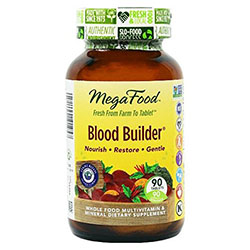
Iron needs certain nutrients in order to provide optimal benefits. The makers of MegaFood Blood Builder Iron Supplement understand this and include plenty of nutrients sourced from natural foods that facilitate the absorption of iron. The result is an extremely effective iron supplement that will help you stave off anemia, maintain energy levels and boost mental acuity.
2. Solgar Gentle Iron 25 MG

Solgar Gentle Iron is a high quality iron tablet from a company with a well-deserved reputation for producing reliable, effective supplements. The “gentle” aspect is iron bisglycinate which helps prevent constipation that can sometimes occur when taking supplemental iron. Like their outstanding calcium supplements it’s pure, effective and dependable.
3. Now Foods Iron 18 mg Essential Mineral

Now Foods have been around for more than 40 years. They make high quality all-natural products like this 18 mg iron and essential mineral supplement that are suitable for vegetarians and are dairy, wheat and gluten free. They contain iron bisglycinate and are produced in accordance with the company’s strict natural product guidelines.
4. Nature’s Bounty Iron 65 Mg
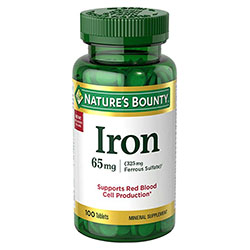
If you have been diagnosed with anemia you’ll want to consider supplementing your diet with Nature’s Bounty 65. This supplement has been carefully crafted to ensure it provides you the iron you need and the supporting nutrients that will enable the iron to work its magic. Each capsule contains 65 mg of iron along with folic acid, Vitamins B12 and C and vegetable cellulose.
5. Sundown Naturals Perfect Iron
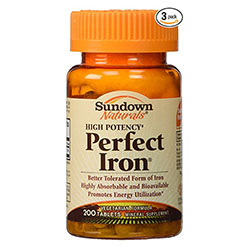
Sundown employs carbonyl iron to prevent constipation and to eliminate other side effects such as nausea. As such you can be sure each 50 mg tablet will provide the iron you need without demanding that you pay a price in side effects. Each tablet contains more than 250% of recommended daily iron so these are perfect for someone struggling with anemia.
6. Pharmics’ Ferretts Iron Supplement, High Potency
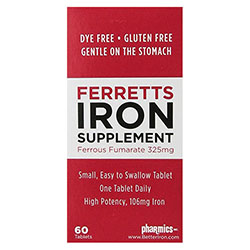
Ferretts Iron Supplement by Pharmics employs ferrous fumarate instead of the standard ferrous sulfate in order to create a supplement that is more easily tolerated. Ferretts is also free of the fillers that can sometimes create problems as well as artificial colorings. This is an easy to tolerate supplement of extremely high potency that will treat your anemia gently and effectively.
7. Thorne Research Iron Bisglycinate 25 mg
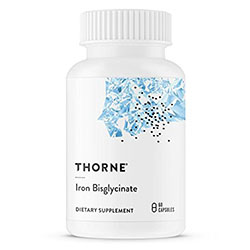
If you tend to suffer from constipation when you take supplemental iron Thorne Research Iron Bisglycinate 25 mg capsules should be on your shopping list. Thorne is known for the purity and effectiveness of their supplements and their 25 mg iron capsules are right in keeping with company tradition. There are no binders, fillers or artificial colorings that can cause distress.
8. GNC Gentlesorb Iron
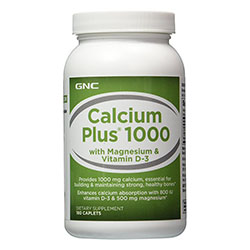
GNC supplements are widely recognized for their consistent quality and effectiveness and Gentlesorb Iron is one of their most highly regarded. Like most of the best iron supplements today Gentlesorb faces the problem of supplemental iron side effects head on and produces an effective work-around in the form of a proprietary mix of iron bisglycinate and other ingredients.
9. New Chapter Iron Supplement Iron Food Complex
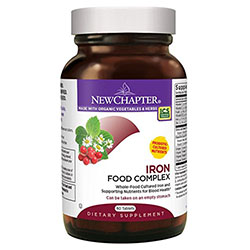
New Chapter Iron Supplement is so gentle you can take it without fear on an empty stomach. Part of that is due to the fact that each capsule contains only 50% of the recommended daily amount of iron. And that’s fine because not everyone is anemic. Iron Food Complex is formulated with more than a dozen nutrients that work together to facilitate iron absorption.
10. Pure Micronutrients Iron Plus Supplement
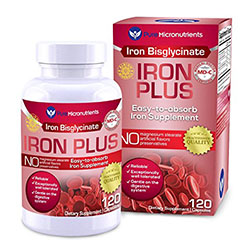
Each Iron Plus Supplement capsule from Pure Micronutrients contains 25 mg of ferrous bisglycinate as well as other nutrients that will help optimize iron absorption including Vitamins B5, B12 and C and folic acid. Iron Plus is gentle on your stomach, gentle on your intestines and effective in combating low levels of iron. And what’s more there’s no bitter aftertaste.
FAQs
How can I boost my iron levels quickly?
There are several things you can do to boost your iron levels quickly:
Increase your intake of iron-rich foods: Foods high in iron include red meat, poultry, seafood, beans, lentils, tofu, spinach, and fortified cereals. Consuming these foods can help increase your iron levels.
Take an iron supplement: Iron supplements, such as ferrous sulfate, can help increase your iron levels quickly. However, be sure to talk to your doctor before taking any supplements, as excessive iron intake can be harmful.
Improve your absorption of iron: Consuming vitamin C-rich foods, such as citrus fruits, tomatoes, and bell peppers, can help improve your body’s absorption of iron.
Avoid foods and drinks that inhibit iron absorption: Some foods and drinks, such as coffee, tea, and calcium-rich foods, can inhibit your body’s absorption of iron. It’s best to avoid consuming these things at the same time you’re eating iron-rich foods or taking iron supplements.
See your doctor and get blood test done: You might have underlying condition that causing iron deficiency and they might be able to help you find the cause of your low iron levels and recommend a treatment plan that’s right for you.
It’s important to note that increasing your iron levels too quickly can be harmful, so it’s best to talk to your doctor before making any changes to your diet or taking any supplements. They can also help you monitor your levels to ensure that you are getting enough iron, but not too much.
Who Benefits from Taking Supplemental Iron?
Since iron deficiency is the most common type of nutritional deficiency it’s only logical to assume that many different types of people suffer from this condition and could benefit from taking some amount of supplemental iron. Here are some of those who would likely benefit from taking an iron supplement:
Those suffering from iron deficient anemia (1) – This is the most obvious group of people who would benefit from taking iron. It also includes millions of individuals from all walks of life. You may yourself suffer from iron deficiency and not be aware of it. Some symptoms would be if you feel dizzy, weak or your memory doesn’t seem as sharp as it was.
Pregnant women or those who may become pregnant – For most women it is recommended they consume as much as 18 mg of iron per day. For pregnant women however that number rises to 27 mg per day. Failing to take enough iron could have negative repercussions on both mother and child.
Athletes – Athletes often find themselves at the doctors wondering why they feel so weak even though they work out constantly and practice good nutrition. Their doctor then informs them that they need to take additional iron when pushing themselves so hard.
Menstruating women – Menstruation is known to deplete your body’s reserves of iron (2) and the only ways to restore proper iron levels are to either eat a diet rich in iron or to take iron supplements. Most women opt for supplements for convenience sake.
Blood donors – There are many good Samaritans out there who donate blood on a regular basis. What some of them don’t realize is that losing so much blood can wreak havoc with iron levels in the body. If you give blood, take iron.
Junk food fans – While a person’s diet is their business the fact is that a diet rich in junk food is typically a diet low in iron, since iron tends to be found in shellfish, turkey, lentils, spinach and other foods you’re not going to find at the burger joint.
Vegetarians – People who don’t eat meat or fish often find themselves struggling with low iron levels. Fortunately there are many iron supplements today that are both vegetarian and vegan safe.
The exact amount of iron you may need should be determined in consultation with your doctor.
What vitamin is best for iron deficiency?
Iron is a mineral that your body needs in order to produce hemoglobin, a protein in red blood cells that carries oxygen throughout your body. When your body doesn’t have enough iron, you may develop iron-deficiency anemia, a condition characterized by a lack of red blood cells.
The most common treatment for iron-deficiency anemia is iron supplements. However, there are several other vitamins and minerals that can help support healthy iron levels in your body:
Vitamin C: Vitamin C can help increase your body’s absorption of iron. It’s found in citrus fruits, bell peppers, tomatoes, and many other fruits and vegetables.
Folic acid: Folic acid is a B vitamin that can help your body produce red blood cells. It’s found in leafy greens, fruits, and fortified grains.
Vitamin B12: Vitamin B12 is another B vitamin that helps your body produce red blood cells. It’s found in meat, fish, eggs, and dairy products.
Copper: Copper is a mineral that helps your body produce hemoglobin. It’s found in leafy greens, nuts, and shellfish.
Zinc: Zinc is an essential mineral that helps your body absorb iron. It’s found in red meat, poultry, and seafood.
Can Excess Iron Cause Atrial Fibrillation?
There is some evidence (3) to suggest that iron overload may predispose a person to atrial fibrillation although the amount of excess iron one would have to take would likely be enormous and need to be continuous over a long period of time.
The best thing to do is consult your doctor before taking supplemental iron in large doses in order to confirm A) that it’s necessary and B) how much to take. If your doctor recommends iron supplementation to correct a deficiency stick to the recommended dose and you should be fine.
What drinks are high in iron?
While most dietary iron comes from food, there are a few drinks that can also be a good source of iron. Here are a few examples:
Fortified cereals: Many brands of cereal are fortified with iron, making them a good source of the mineral.
Molasses: Molasses is a syrup that is a byproduct of sugar refining, it can be a good source of iron, as well as other minerals like calcium, potassium, and zinc.
Prune juice: Prune juice is high in iron and also high in fiber, which can help regulate digestion.
Tomato juice: Tomato juice is rich in vitamin C which aids in the absorption of iron and also a good source of Iron itself.
Blackstrap or Soy sauce: Although not as high as other source, it can provide some iron to your diet.
fortified Plant-based milk: some brands of plant-based milk, such as soy milk, are fortified with iron, making them a good source of the mineral.
Even though these drinks are high in iron, they may not provide as much iron as iron-rich foods like red meat, poultry, and seafood. It is also important to consider if you have any dietary restrictions or allergies when considering consuming any of these.
It’s also a good idea to talk to your doctor or a registered dietitian if you’re considering incorporating any of these drinks into your diet to make sure they’re appropriate for you.
What is the Best Way to Take Iron?
Iron supplements are generally taken just like a multivitamin. There are however, certain things you can do to increase effective absorption. One of them is to take your iron supplement on an empty stomach.
If you have taken iron before and suffered side effects like constipation you’ll want to be sure your supplement is made using a gentle form of iron, like iron bisglycinate. If you take the gentler formulation and still suffer discomfort you should try taking the iron with a bit of food.
Certain types of food, however, are also known to interfere with iron absorption and should be avoided if you are taking iron supplements. These include most high fiber foods like whole grains and raw vegetables.
Calcium supplements while important for many people, may also wind up interfering with iron absorption so you’ll need to talk to your doctor about finding a balance between your calcium and iron intakes.
Doctors sometimes suggest you take your iron supplement with a glass of orange juice as the vitamin C is believed to help absorption rates (4). All that said the absolute best way to get your iron is by eating a balanced diet that includes foods rich in iron. But that is easier said than done these days.
What does low iron feel like?
Low iron, or iron-deficiency anemia, occurs when your body doesn’t have enough iron to produce enough hemoglobin, a protein in red blood cells that carries oxygen throughout your body. If you have low iron, you may experience a variety of symptoms, including:
Fatigue: One of the most common symptoms of low iron is fatigue. This can be a feeling of exhaustion, weakness, or lack of energy.
Pale skin: People with anemia have a lower number of red blood cells and so can look pale.
Shortness of breath: With low iron, your body may not have enough oxygen to support normal breathing, which can cause shortness of breath or difficulty catching your breath.
Headaches: Some people with low iron may experience headaches or migraines.
Cold hands and feet: Low iron can lead to a decrease in the number of red blood cells, which can cause problems with circulation, making hands and feet feel cold.
Brittle nails: Low iron levels may lead to dry, cracked and brittle nails.
Dizziness or Lightheadedness: Blood cells carry oxygen to the brain, so when there is a shortage of blood cells, the brain may not get enough oxygen, causing dizziness or lightheadedness.
Heart palpitations: Low iron can cause anemia which can put extra stress on your heart, leading to fast or irregular heartbeat.
These symptoms may be caused by other conditions as well, so it is important to see your doctor if you are experiencing any of these symptoms to get proper diagnosis and treatment. If your iron levels are low, your doctor can recommend treatment options such as dietary changes, supplements, and in severe cases, a blood transfusion.
What are the Side Effects of Taking Iron?
We touched on these already but they merit a bit of exposition.
Constipation – The most common side effect of taking supplemental iron is constipation. In recent years however producers have modified their formulas to make them much less harsh and many have nearly eliminated constipation from the side effect list. Still, cheap iron supplements are likely to use less desirable ingredients and result in your being constipated.
Stomach Distress – Excessive amounts of iron are known to cause stomach distress. This may include diarrhea, stomach pain, nausea and, in more severe cases, vomiting.
Minor levels of stomach distress are typically nothing to be too concerned about however, and can often be alleviated by having a little something to eat with the supplement.
There are a couple of things you can usually do to avoid these and other side effects including having something to eat along with your supplement, making sure you only buy high quality supplements like the ones listed above and making sure you don’t engage in medical improvisation by taking more than the recommended dose.
Keep in mind too that iron can sometimes be contraindicated (5) if you are already taking other medications. Talk to your doctor to find out if the medication you’re talking would react poorly to supplemental iron.
What Should I Look for in an Iron Supplement?
You have a dizzying array of iron supplements to choose from today but not all are created equal. Here are the things you should look for to ensure you get a reliable, effective iron supplement.
The brand – We start with this because there are a lot of fly-by-night “nutrition” companies out there peddling placeboes as various types of supplements. As such it’s important you stick to the recognized brands unless you have specific, verifiable knowledge that an unknown brand is worth buying.
The amount of iron in each capsule – Not everyone is anemic as we said above and so not everyone is going to need 300% of the daily recommended amount of iron. In most cases folks just need a little something to top up the iron tank; perhaps 15 or 25 mg a day. Speak with your doctor to determine exactly how much you should be taking.
The type of iron – Being 2018 you’ll want to stick with an iron supplement with iron bisglycinate, iron bisglycinate chelate or iron ferrous bisglycinate as these will be easier on your stomach. While not everyone is sensitive to iron it doesn’t make any sense to tempt fate if you don’t have to.
Additional nutrients – Some supplements are just iron while others offer various additional nutrients intended to facilitate absorption. The most common of these additional nutrients are folic acid along with Vitamins C, B6 and B12. Not everyone will need these additional nutrients but they can’t hurt.
Price – When it comes to your health money should not be a primary concern but the fact is there are some iron supplements that are worth paying a bit extra for and some that aren’t worth the discount price you paid for them. Stick with the iron supplements on this list and you’ll be doing just fine.
Can vitamin B12 increase iron levels?
Vitamin B12 is a nutrient that plays an important role in the production of red blood cells, but it doesn’t directly increase iron levels in the body. Iron and vitamin B12 work together to produce healthy red blood cells, but they are not the same thing.
Vitamin B12 helps your body produce a substance called methylmalonic acid, which is necessary for the production of red blood cells. A deficiency of vitamin B12 can lead to anemia similar to iron-deficiency anemia.
Both deficiency of iron and Vitamin B12 can cause fatigue, weakness and pale skin. They both have similar symptoms and for that reason, it is important to work with a doctor to get the correct diagnosis if you are experiencing any of these symptoms.
It’s possible to have a deficiency in both iron and vitamin B12 at the same time, which would require a combination of iron and vitamin B12 treatment to resolve.
Vegetarian and vegan diet lack animal products which are the main source of Vitamin B12, So they might want to take vitamin B12 supplements. Your doctor or a registered dietitian can advise you on the appropriate treatment, depending on your specific situation.
Conclusion
Iron is an essential mineral that is necessary for the production of hemoglobin, a protein found in red blood cells that carries oxygen throughout the body.
When your body doesn’t have enough iron, you may develop iron-deficiency anemia, a condition characterized by a lack of red blood cells and resulting in fatigue, weakness, and pale skin. One of the most common treatments for iron-deficiency anemia is an iron supplement.
Iron supplements are typically available in the form of ferrous sulfate, ferrous fumarate, or ferrous gluconate. Iron supplements can be taken orally or intravenously. They can help increase your iron levels quickly, alleviate symptoms of anemia, and improve your overall health.
It is important to note that taking an iron supplement can be harmful if taken in excessive amount, so it’s crucial to talk to your doctor before taking any supplements, they can also monitor your levels to ensure you are getting enough iron.
They can also help you find the cause of your low iron levels and recommend a treatment plan that’s right for you. Additionally, it’s important to consider your dietary restrictions and allergies before taking any supplement.
In conclusion, Iron supplements can be an effective treatment for iron-deficiency anemia, they can help increase iron levels, alleviate symptoms, and improve overall health. However, it’s important to work with a doctor to determine if an iron supplement is the best treatment for you, as well as the appropriate dosage.

